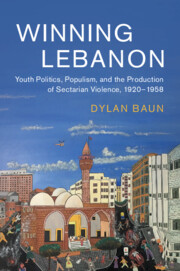
- Cited by 17
-
Cited byCrossref Citations
This Book has been cited by the following publications. This list is generated based on data provided by Crossref.
2020. The Muslim Brotherhood in Jordan. p. 55.
2020. The Muslim Brotherhood in Jordan. p. 1.
2020. The Muslim Brotherhood in Jordan. p. 25.
2020. The Muslim Brotherhood in Jordan. p. 155.
2020. Winning Lebanon. p. 216.
2020. The Muslim Brotherhood in Jordan. p. 252.
2020. The Muslim Brotherhood in Jordan. p. vii.
Wagemakers, Joas 2020. The Muslim Brotherhood in Jordan.
2020. The Muslim Brotherhood in Jordan. p. 84.
2020. The Muslim Brotherhood in Jordan. p. 194.
2020. The Muslim Brotherhood in Jordan. p. 246.
2020. The Muslim Brotherhood in Jordan. p. 278.
2020. The Muslim Brotherhood in Jordan. p. 123.
2020. The Muslim Brotherhood in Jordan. p. 232.
2022. Creating Consent in an Illiberal Order. p. 231.
Ferguson, Susanna 2023. Sex, Sovereignty, and the Biological in the Interwar Arab East. Modern Intellectual History, Vol. 20, Issue. 1, p. 220.
Leidy, Joseph 2023. El Zaím: Youth, Authority, and Syrian Nationalism in the Mahjar, 1938–1944. Mashriq & Mahjar: Journal of Middle East & North African Migration Studies, Vol. 10, Issue. 1,
- Publisher:
- Cambridge University Press
- Online publication date:
- October 2020
- Print publication year:
- 2020
- Online ISBN:
- 9781108863230




